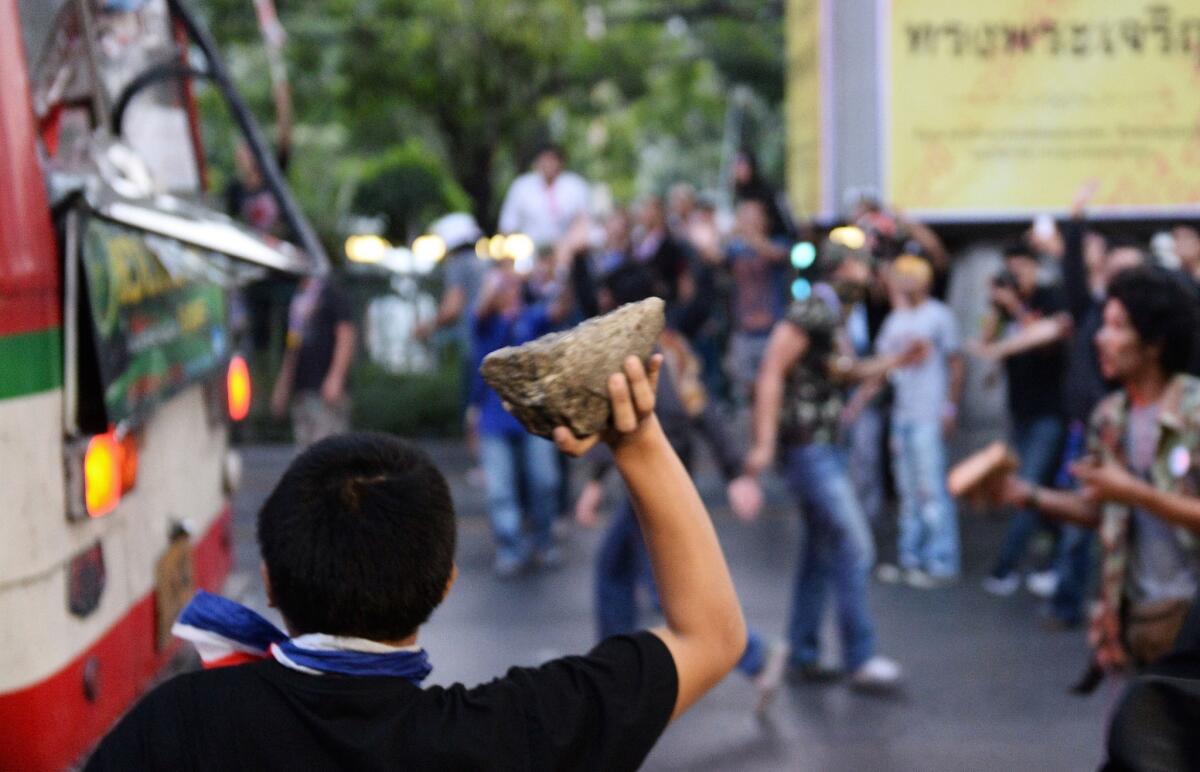At least one dead in Thailand protests

BANGKOK, Thailand â Anti-government protests turned violent Saturday with at least one person killed in the Thai capital after opponents and supporters of Prime Minister Yingluck Shinawatra clashed.
Protests had remained relatively peaceful over the last week as the two sides essentially stayed apart during daily demonstrations. But on Saturday, opponents of Yingluck gathered near the site of a pro-government rally being held inside a stadium.
Using sticks, stones and chunks of concrete, several hundred protesters, many of them students, took aim at government supporters some 50 yards away up a dark street behind Ramkhamhaeng University.
Soon, small explosions and what sounded like gunfire rang out. âRun back,â shouted some of the 60 or so anti-government students.
Local media reported at least one person was killed and at least three hospitalized.
About a half a mile away, another small group of anti-government protesters yelled and whistled at several hundred government supporters, who armed themselves with sticks inside the stadium car park behind police.
This followed an earlier incident in which students attacked a taxi they thought was carrying government supporters to the stadium, roughing up several foreign photojournalists before attacking a city bus.
One anti-government protester, who gave his name as Komol, said the protesters would press ahead even if outnumbered or attacked. âWe have heard they will come, and we will fight,â he said. âWe donât want this corrupt government anymore.â
Police reportedly have called for the militaryâs help in maintaining security in the city. National police spokesman Piya Utayo, speaking on Thai television, said over 2,700 personnel from the army, navy and air force have been called in.
Inside the stadium Saturday, some 50,000 government supporters listened to impassioned speeches. A huge banner draped across one end of the stadium with a picture of anti-government leader Suthep Thaugsuban read: âStop Hijacking Thailand.â
Apiwan Wiriyachai, a senior pro-government leader, lawmaker and former army officer, said heâd spoken with top army leaders who assured him they didnât want to intervene. Thailand has had many coups and attempted coups since it became a democratic monarchy in 1932.
âHe doesnât want to make a coup,â Apiwan said, referring to army chief Gen. Prayuth Chan-ocha, âas we discussed that other countries in the world do not want to associate with countries that are not a democracy.â
Thailandâs political crisis was sparked by a bill introduced in parliament last month by Yingluckâs administration that would have granted amnesty to her controversial brother, Thaksin Shinawatra, potentially paving the way for his return to the country. The bill was defeated in the Senate but shattered an uneasy political calm.
Thaksin, a telecommunications tycoon and former premier, was convicted in 2008 on corruption charges, prompting him to go into self-imposed exile in London and Dubai. Critics say Thaksinâs wealth bought Yingluckâs election in 2011 and accuse her of being a puppet for her older brother, charges she denies.
Thaksin is a polarizing figure in Thailand, enjoying strong support among the rural poor but despised among many prosperous city dwellers, especially those closely aligned with the army and the monarchy.
Some 100,000 people attended an anti-government demonstration Sunday. Since then, protesters have surrounded and occupied the finance and foreign ministries and other government buildings hoping to disrupt Yingluckâs administration and make her appear ineffective.
On Friday, hundreds forced their way into army headquarters in Bangkok, while on Saturday several hundred people gathered outside state-owned telecommunications companies. After protesters cut power to two important telecom centers, there were reports of greatly reduced Internet connection speed.
Yingluck has pledged not to use violence against the protesters. In recent days, however, sheâs invoked special powers that allow her government to impose curfews and road closures. Police also have issued an arrest warrant for protest leader Thaugsuban, an ex-lawmaker with the Democratic party, although theyâve so far made no move to take him into detention.
Suthep has repeatedly rejected invitations to negotiate with the government and has called for a âpeopleâs councilâ rather than a fully elected parliament to lead the country, prompting critics to question his commitment to democracy. Yingluck has rejected that approach as unconstitutional and has repeatedly ruled out stepping down or calling a snap election. She easily survived a no-confidence vote Thursday.
This weekâs protests are the largest since Thaksin supporters occupied parts of Bangkok in April and May 2010. That ended when the military cracked down on demonstrators, killing over 90 people.
While Saturdayâs violence was relatively isolated, it quickly raised fears of more political turmoil and instability, particularly if more government supporters arrive from the rural areas.
Thailandâs King Bhumibol Adulyadej, the worldâs longest reigning monarch, celebrates his birthday on Thursday and anti-government protesters have pledged to occupy most government buildings Sunday, perhaps hoping to end the demonstrations before national celebrations.
Special correspondent Roughneen reported from Bangkok and staff writer Magnier reported from Aurangabad, India.
ALSO:
Silvio Berlusconi accused of bribing witnesses in âbunga bungaâ trial
Protesters storm Thailand army headquarters in bid to oust premier
U.S. commander in Afghanistan apologizes for civilian death, injuries
More to Read
Sign up for Essential California
The most important California stories and recommendations in your inbox every morning.
You may occasionally receive promotional content from the Los Angeles Times.










